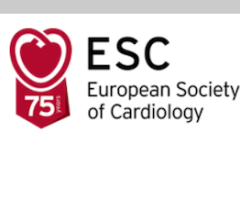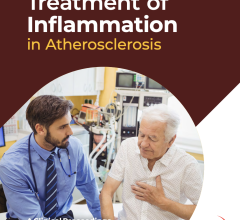
A joint statement by the AHA and ACC has been issued on a new guideline for the treatment of chronic coronary disease. Image courtesy: AHA.
August 9, 2023 — A joint statement by two medical associations has been issued on a new guideline for the treatment of chronic coronary disease. It notes that for the more than 20 million people in the U.S. with chronic coronary disease, a heart-healthy diet and lifestyle are the best ways to prevent worsening health. The latest joint guideline for chronic coronary disease from the American Heart Association (AHA) and the American College of Cardiology (ACC) was simultaneously published July 20 in the American Heart Association’s flagship journal Circulation and in the Journal of the American College of Cardiology, JACC.
The guideline affirms the value of a healthy diet, regular physical activity and not smoking, and updates several medication recommendations, including the use of SGLT-2 inhibitors, GLP-1 receptor agonists beta blockers, and bempedoic acid and inclisiran, according to the most recent scientific data, noted the announcement.
Chronic coronary disease (CCD) is an umbrella term used to describe a variety of long-term vascular and heart conditions in which there is inadequate blood flow to or from the heart. It applies to people with chronic, heart-related chest pain; people who have had a heart attack, coronary stent or bypass surgery; and people who have evidence of reduced blood flow to the heart based on diagnostic testing.
“The science that informs the management of care for people with chronic coronary disease has evolved significantly since the 2012 guideline and the subsequent 2014 update,” said Salim S. Virani, MD, PhD, FAHA, FACC, and chair of the American Heart Association and American College of Cardiology joint guideline writing committee, vice provost for research at Aga Khan University in Pakistan, and a cardiologist at the Texas Heart Institute and adjunct professor at Baylor College of Medicine, both in Houston. “The good news is that chronic coronary disease is a very manageable disease now. With healthy lifestyle habits and medical therapy, which has advanced tremendously, the prognosis for patients with CCD has dramatically improved.”
The American Heart Association and the American College of Cardiology provide three principles for managing patients with CCD:
Prioritize treatment based on a patient’s risk for future cardiovascular events; Symptom relief and quality of life are extremely important; and Team-based care is recommended for people with CCD including primary care clinicians in collaboration with cardiology specialists.
Quality of life is an important consideration and includes evaluating treatment options from the patient’s perspective. The guideline recommends clinicians perform a comprehensive risk assessment at annual follow-up visits to evaluate all medical and social factors that are associated with heart health in patients with CCD.
Clinicians are advised to carefully review the risk assessment with their patients and educate them on symptom management and treatment options so they may actively participate in decisions about their care. In some cases, based on the risk assessment and conversations with the patient, clinicians may recommend therapies for symptom relief that may not prolong life or reduce the risk of cardiovascular events.
“It is crucial for patients with CCD to have regular conversations about their condition with their health care professionals,” Virani said. “These discussions are needed to ensure that patients are following the most recent diet, physical activity and other lifestyle recommendations and receiving all the appropriate evidence-based therapies. This helps balance a good quality of life with reducing the risk of a future cardiovascular event.”
The guideline emphasizes coordinating care between cardiovascular and primary care professionals because the care team interacts with a person with CCD multiple times over a long period and treatment should be continually assessed.
“Management of CCD is a team sport,” Virani said. “Clinicians in both primary and specialty care should fully leverage all members of the cardiovascular care team, including physicians, nurse practitioners, physician assistants, nurses and nursing assistants, pharmacists, dietitians, exercise physiologists, physical, occupational and speech therapists, psychologists and social workers to maximize benefits to patients with CCD.”
Additional medication and lifestyle recommendations from the guideline include:
Glucose-lowering medicines - Two classes of medications traditionally used to treat Type 2 diabetes, SGLT-2 inhibitors and GLP-1 receptor agonists, have potential cardiovascular benefits in addition to controlling blood sugar. Both types of medicines help with weight loss, reduce the progression of kidney disease and reduce the risk of cardiovascular events even in patients with CCD who do not have Type 2 diabetes.
Beta-blocker medications – Beta-blockers are a class of medicines that decrease the heart rate and force of the heart’s contractions, thus lowering blood pressure. New in this guideline, routine use of beta-blockers for longer than one year is not recommended in patients with CCD who have not had a heart attack within the past year or those who have left ventricular ejection fraction at or above 50% (meaning the heart is pumping blood effectively to meet the body’s needs).
New cholesterol-lowering medicines - Statins remain the first choice of medications to lower cholesterol. However, newer medicines may be considered for treating people with CCD whose cholesterol levels remain high or who do not tolerate statins. These medicines include ezetimibe, PCSK9 inhibitors, bempedoic acid and inclisiran.
Less time on antiplatelet medicine – Antiplatelet medication helps prevent clotting in people who have had a heart attack, stroke, chest pain or other cardiovascular conditions. A second antiplatelet may be added to the treatment regimen for some patients and is referred to as dual antiplatelet therapy. The guideline recommends a shorter duration of dual antiplatelet therapy in many circumstances. Supplements not recommended - There is not enough evidence showing whether non-prescription nutrition or dietary supplements — including omega-3 fatty acids, vitamins C, D, or E, beta-carotene or calcium — are beneficial for people with CCD.
When tests are not needed - Routine follow-up screening with stress testing or computed tomography is not recommended for patients who are on guideline-directed therapies and have not had any changes in symptoms or functional status.
Smoking cessation - For people with chronic coronary disease who regularly smoke, behavioral interventions are recommended in combination with nicotine replacement therapy to aid in quitting smoking. In select patients with chronic coronary disease who regularly smoke, the short-term use of e-cigarettes for smoking cessation may be considered in consultation with a medical professional. However, people who use e-cigarettes to quit smoking should be warned about the risk for developing long-term dependence on e-cigarettes and be encouraged to quit promptly to avoid potential long-term risks. Because of the lack of long-term safety data and the risks of sustained use, e-cigarettes are not recommended as first-line therapy for smoking cessation for people with chronic coronary disease.
“Our understanding about the role of social determinants of health, shared decision-making and the need to fully leverage a team-based approach to care has evolved and improved based on new evidence,” Virani said. “The guideline consolidates the new information for the latest evidence-based recommendations to guide care for people with CCD.”
For more than 40 years, the American Heart Association and the American College of Cardiology have collaborated to translate scientific evidence into clinical practice guidelines with recommendations to improve cardiovascular health. This guideline was developed in collaboration with and endorsed by the American College of Clinical Pharmacy, the American Society for Preventive Cardiology, the National Lipid Association and the Preventive Cardiovascular Nurses Association. The guideline is also endorsed by the Society for Cardiovascular Angiography and Interventions. The writing group included representatives from each of the collaborating organizations. Co-authors and all disclosures are listed in the manuscript.
More information: www.acc.org and www.heart.org


 February 04, 2026
February 04, 2026 









